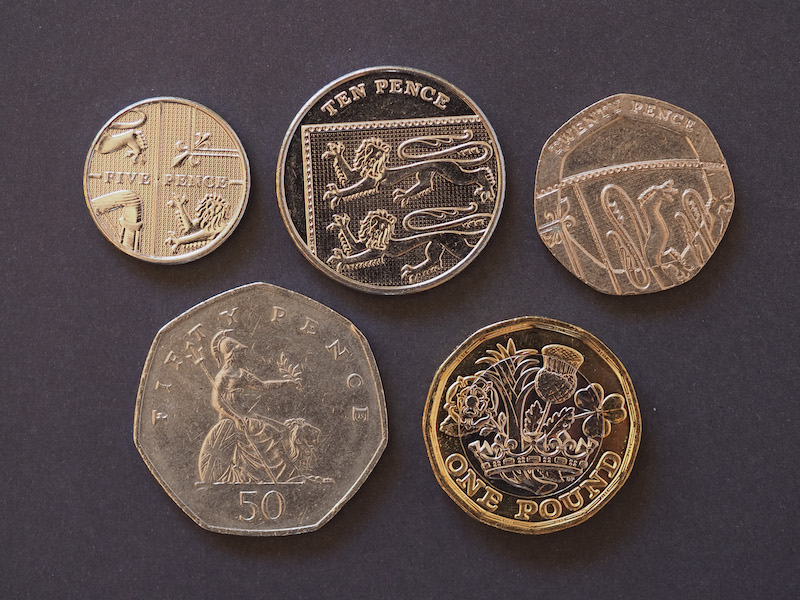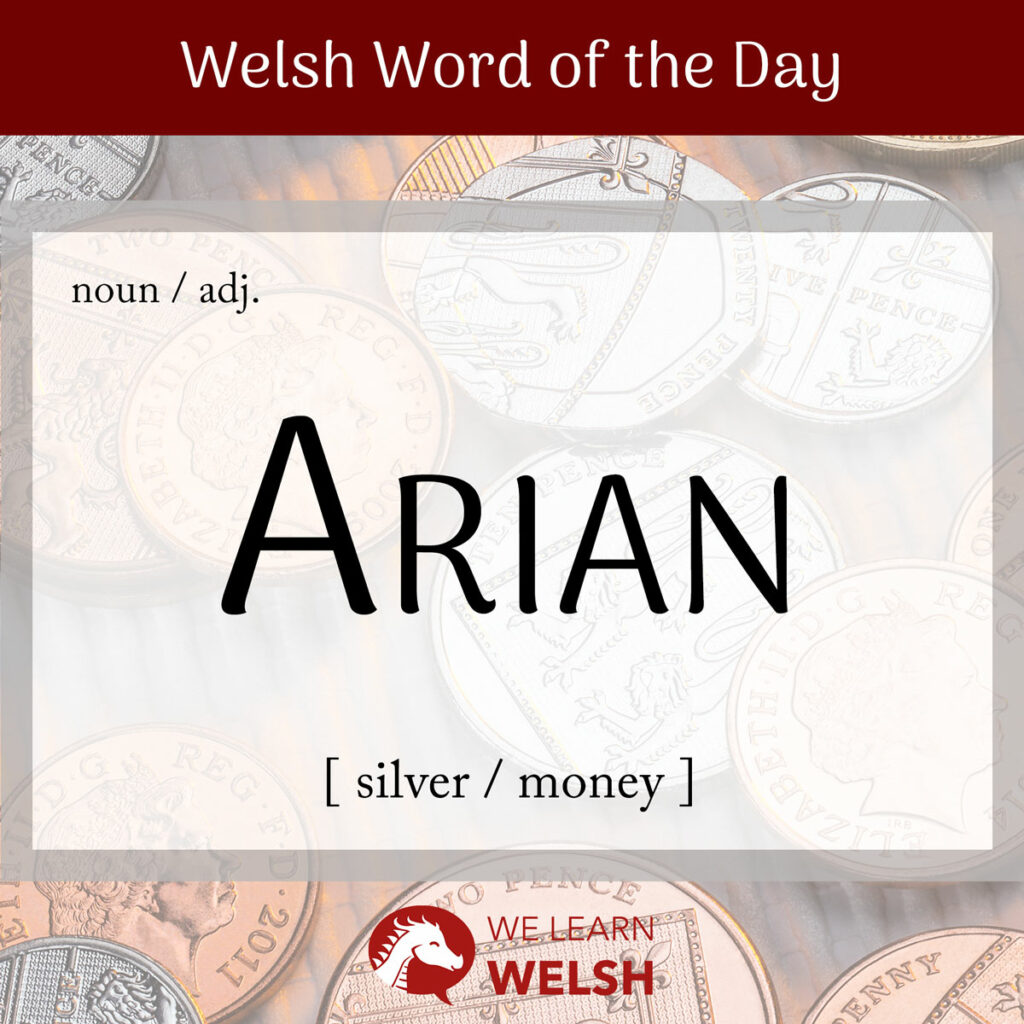Have you ever heard, maybe in slightly old-fashioned English literature, coins referred to as silvers? Well, in Welsh, that equivalency has lasted into the modern day – arian is the Welsh word for the colour silver, the metal silver, and for money.
arian
silver / money
Arian comes from the Old Welsh argent. This is related to the Latin argentum, which is the reason that the element is symbolised ‘Ag’ on the periodic table. Argentum is also the root of Argentina; in the colonial era, it was rumoured to be a mythical source of endless silver.
The word for the colour, and the word for money, are both based on the original meaning of arian as referring to the metal. This is the same in most European languages. Arian for the colour evolved by way of arianlliw (silver-coloured). A similar process occurred for orange, which was originally lliw oren (orange-coloured) after the fruit, but is now simply oren.
Arian as an adjective can refer to something that is made of silver, silver in colour, or silvery. Ariannaidd is a synonym, and we can also use it as a verb – ariannu means to go silver, although if we were talking about hair going silver we would instead use gwynnu or britho.
One beautiful phrase reported in Geiriadur Prifysgol Cymru is llwybr arian. This literally translates to silver path, and is said to refer to the reflection of moonlight in water.
Mae hi’n gwisgo modrwy arian.
She is wearing a silver ring.
When it comes to money, arian is both the standard, and the Southern, word. However, pres is very common in the North, borrowed from the Old English bræs (brass). Other regional variations include mags or cregyn heddwch in the Northwest, tocins/tocyns in the Cardiff area, and even the incredibly fun spondiwlics around Nantlle in Gwynedd.
As a noun, arian is masculine. It’s usually uncountable, so there’s not really a need for a plural. However, if you did want to translate moneys, you could use ariannau or ariannoedd as with the adjective.
You’d likely have more need to talk about singulars and plurals if you were talking about coins, which are darnau arian or pisiau arian (sometimes tocyns in the South). The singular form of coin is darn arian or pisyn arian.
Here are some common ways you might use the word arian when talking about money.
- cynilo arian / cadw arian = save money
- ennill arian = earn money [literally: win money]
- gwario arian = spend money
- gwastraffu arian / afradu arian = waste money
- dodi arian [mewn rhywbeth] = to put money [into something]
- buddsoddi arian = invest money
- rhoi’ch arian = to part with one’s money
- bathu arian = to mint coins
- etifeddu arian = to come into money
- cyfrannu arian = contribute money
Arian doesn’t mutate because it starts with a vowel. However, it undergoes h-prosthesis (this means a ‘h’ is added to the beginning of the word) after ein (our), eu (their), or ei (his or her) when it is used to mean hers.
Roedd y brenin a’r frenhines yn cyfrifo eu harian.
The king and the queen were counting their money.
As we know, the word arian for money comes from the money silver, but we also use copors / arian cochion (coppers), and, though it’s not common these days amongst even very rich people, arian can also be stored in the form of aur (gold).
On a more day-to-day level in the UK, arian is counted in ceiniogau (pennies) and punnoedd (pounds). In the US and in many places internationally, the equivalent is sentiau (cents) and doleri (dollars).
Some people are money savvy and good at all things ariannol (financial), whereas others always find themselves heb yr un geiniog (literally: without even one penny, stony broke). Unfortunately, most things in life require talu (paying), so it’s a good idea to get one’s cyllidau (finances) in order, even if you’ll never have a gwerth arian (fortune).
These days, it’s becoming less and less common to carry arian parod (cash), as the internet and advancing technology have made it easy to conduct transactions using cardiau coel (credit cards) or even your ffôn symudol (mobile phone). It’s still worth knowing the phrase though, and it’s interestingly one of the only places in modern Welsh where parod occurs in its original, unmutated form, as it normally occurs mutated as barod.
If you are a bit more old-fashioned, the ordinary place to store arian mân (small change) is in a pwrs (purse) or waled (wallet), although little children may save their arian poced (pocket money) up in a cadw-mi-gei (piggy bank). As adults we are more likely to use a regular banc (bank) – another, less common word for this is ariandy.
When we withdraw arian from the banc, it’s usually in the form of papurau punnoedd (banknotes) rather than darnau arian. We might use a peiriant arian (cash machine) or speak directly to an ariannwr (cashier).
Banceriaid (bankers) have a reputation for being ariangar (greedy, money-hungry). You can decide for yourself whether or not you think that’s fair!


